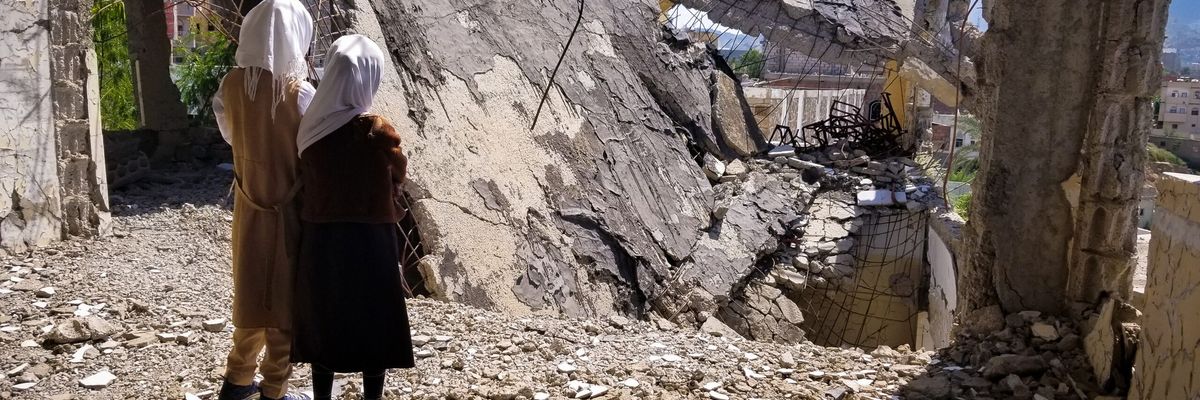This week the Pentagon released its annual report outlining the civilian harm caused by operations across the globe. It vastly undercounts the number of civilians the United States is killing in conflicts.
Annual reports, such as this 21-page “Annual Report on Civilian Casualties In Connection With United States Military Operations in 2020,” have been a requirement of U.S. law since 2018. They are meant to cover all civilian harm caused by ongoing U.S. military actions around the world, including in Afghanistan, Iraq, Syria, Somalia and Yemen.
For 2020, the Department of Defense concluded its forces had killed 23 civilians and injured a further 10. But that number is nearly five times lower than the tally we at Airwars produced. In total, our estimate (which we believe to be conservative) concluded that at least 102 noncombatant deaths likely resulted from U.S. attacks in Afghanistan, Iraq, Somalia and Syria alone.
The biggest discrepancy comes in Afghanistan. The United States admitted killing 20 civilians in seven events during 2020. Yet the United Nations Mission in Afghanistan found the death toll to be more than four times higher, at 89 killed and a further 31 injured by international military forces. U.S. personnel made up the great majority of those international forces.
In Iraq and Syria, the end of the Islamic State as a territorial entity has seen the ferocity of the U.S. campaign subside significantly in recent years. Yet, the Pentagon’s estimate of only one death still stands in sharp contrast to our records, which found between three and six deaths that were likely caused by U.S. strikes.
Rather than serving as a good example of transparency, this one casualty showcases the ways in which the Pentagon undercounts casualties. The civilian casualty occurred on March 13 last year when U.S. forces targeted Iranian linked militias at Karbala airport. The United States concluded that a 23-year-old civilian security guard, Karrar Sabbar, was killed. Public reporting claims that two more civilian police officers also died. It remains unclear why they weren't included in the Pentagon toll.
In Somalia, between seven and 13 civilians were likely killed by U.S. actions during the year, according to Airwars’ monitoring of local communities. But DOD declared only one civilian death from U.S. actions in that time. It is only in Yemen that monitoring organizations and the Pentagon can agree with both groups’ finding no likely civilian deaths caused by U.S. actions during the year.
This is not to say there are no positive aspects to the new Defense Department report. While it is easy to criticize, the report still represents a significant transparency benchmark for other militaries and represents a precedent to follow. Put bluntly, none of the U.S.'s closest allies, including the United Kingdom, France, and other European nations, even come close to reporting on civilian fatalities in such a systemic manner.
Nevertheless, the discrepancies between Pentagon estimates of civilian casualties and those of independent organizations are worrying.
At the same time, the report also reveals that no condolence payments were made to the families of the victims that the Pentagon did acknowledge, despite Congress allocating $3 million for exactly this purpose. This has been a common trend in the United States in recent years and we are scratching our heads trying to understand why it still isn't happening.
In cases such as those of Karrar Sabbar, the security guard killed in that Iraqi strike, the United States has admitted accidentally killing him and there is money available to support his family who have been left behind. So why isn't the U.S. military establishment giving it to them? It suggests a worrying lack of interest in the devastating impact of those U.S. actions which killed or injured civilians.
Later this year, the Pentagon will issue a major update of its civilian casualty mitigation policies, known as a Department of Defense Instruction, which has been in review in consultation with human rights organizations for several years. On May 25, new Under Secretary of Defense for Policy Dr. Colin Kahl confirmed in writing to NGOs that the new policy would be published by the Biden administration shortly. This is a welcome development, and it seems the Biden administration is actively engaging on civilian harm. But many good laws are already on the books and yet estimates of civilian harm are consistently low and no compensation is given to families.
















